
Old Compton Street is a road that runs east–west through Soho in the West End of London.
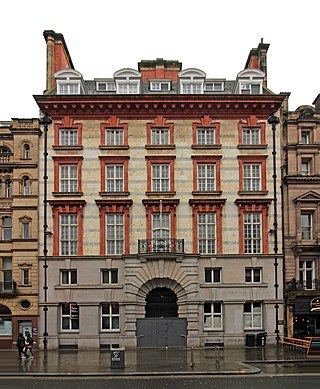
The National Westminster Bank, Castle Street, Liverpool, England is a Grade II* listed building.

Nottingham city centre is the cultural, commercial, financial and historical heart of Nottingham, England. Nottingham's city centre represents the central area of the Greater Nottingham conurbation.
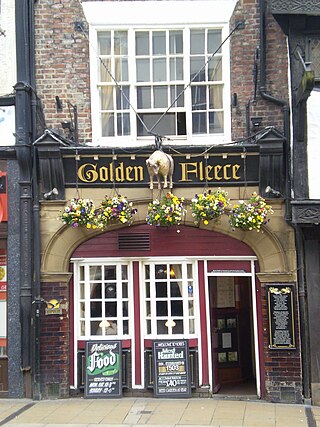
The Golden Fleece is an inn in York, England, which has a free house pub on the ground floor and four guest bedrooms above. It dates back to at least the early 16th century, and claims to be the most haunted public house in York.

Terry's is a British chocolate and confectionery maker, formerly based in York, England, until 2005, and re-established in 2019 as Terry's Chocolate Co and based in London. The company was founded in 1767. The company's headquarters and factory, Terry's Chocolate Works, was closed by Kraft in 2005. Their best known products include Terry's Chocolate Orange, and Terry's All Gold box of assorted chocolates.
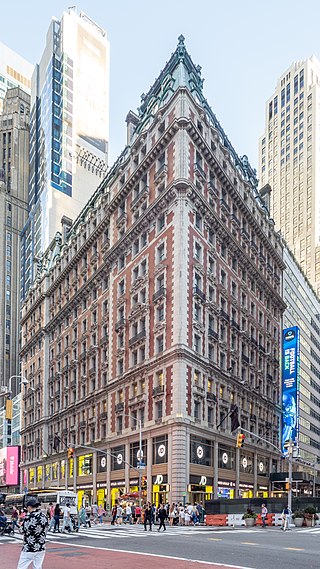
The Knickerbocker Hotel is a hotel at Times Square, on the southeastern corner of Broadway and 42nd Street, in the Midtown Manhattan neighborhood of New York City. Built by John Jacob Astor IV, the hostelry was designed in 1901 and opened in 1906. Its location near the Theater District around Times Square was intended to attract not only residential guests but also theater visitors.

The Light is a leisure and retail centre in central Leeds in West Yorkshire, England. It occupies the rectangular space between The Headrow on the south, St Anne's Street on the north, Cookridge Street on the west, and Albion Street. Two former streets divide it: Upper Fountaine Street (east-west) and Cross Fountaine Street (north-south) now covered with a glass roof. It incorporates two listed buildings Permanent House and the Headrow Buildings.

1 Hanover Square is a commercial building on the southwestern edge of Hanover Square in the Financial District of Lower Manhattan in New York City. It was the site of the United States' first cotton futures exchange, the New York Cotton Exchange.

The Old Wellington Inn is a half-timbered pub in Manchester city centre, England. It is part of Shambles Square, which was created in 1999, and is near Manchester Cathedral. It is a Grade II listed building.

The Memorial Hall in Albert Square, Manchester, England, was constructed in 1863–1866 by Thomas Worthington. It was built to commemorate the bicentennial anniversary of the 1662 Act of Uniformity. One of the best examples of Venetian Gothic revival in the city, the hall is a Grade II* listed building.

The Belmont Hotel is a twelve-story residential hi-rise built as a hotel on the capitol square in Madison, Wisconsin in 1924. At that time it was the tallest building near the capitol and concern that it blocked the view prompted height-limit restrictions that are still in place. In 1990 the building was placed on the National Register of Historic Places.

One New Change is a major office and retail development in the City of London. It comprises 560,000 square feet (52,000 m2) of floor space, including 220,000 square feet (20,000 m2) of retail space and 330,000 square feet (31,000 m2) of office space and is the only large shopping centre in the City of London, the historic nucleus and modern financial centre of London. It cost £500 million to build and was completed in October 2010.
Bonis Hall is a former country house to the north of Prestbury, Cheshire, England. It was the seat of the Pigot family until 1746, when it was bought by Charles Legh of Adlington. In the early part of the 19th century it was remodelled and used by the Legh family as a dower house. In the early 20th century the exterior was pebbledashed, and castellations were added

Munro House is a building in Leeds, West Yorkshire, England, situated at the corner of Duke Street and York Street.
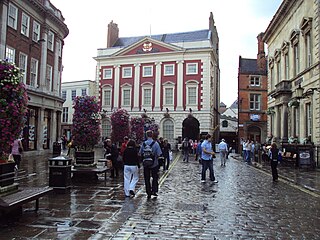
St Helen's Square is an open space in the city centre of York, England.
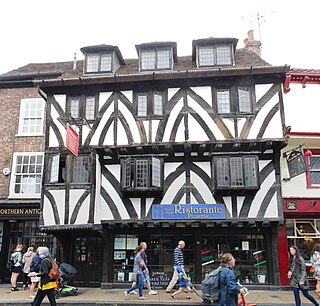
41–45 Goodramgate is a grade I listed building in the city centre of York, in England.

The York County Savings Bank Building is a historic building in the city centre of York, in England.

Ye Olde White Harte is a public house in Hull, England. It was built around 1660 in the Artisan Mannerist but did not become a pub until the 1730s. In the aftermath of the Glorious Revolution of 1688 it was the site of a successful plot to remove the Catholic Governor of Hull. The pub was remodelled in 1881 in the Romantic style with extensive alteration to the interior and façade. At least two residents have suffered fatal accidents in the pub and it is reputed to be "one of Hull's most haunted".
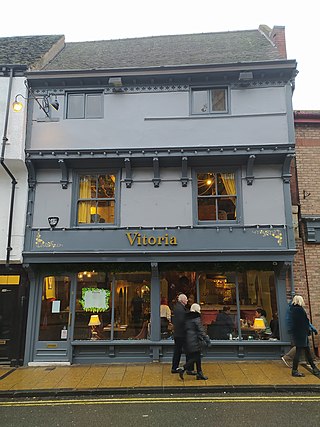
26 Coppergate is a historic building in the city centre of York, in England.

The Golden Ball is a pub in the Bishophill area of central York, in England.



















